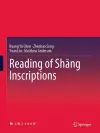
Reading of Shāng Inscriptions
4 authors - Hardback
£99.99
Kuang Yu Chen is a Distinguished Professor at Rutgers University where he serves at the Department of Chemistry and Chemical Biology, as well as at the Department of Asian Languages and Cultures. He is a board member of the Confucius Institute at Rutgers and an elected Fellow of the American Association for the Advancement of Science. He was a speaker at the 2018 Colloquium Series of the Institute of Archaeology, Chinese Academy of Social Sciences, Beijing, and in 2019, he was the keynote speaker at the International Conference on Paleography and Unearthed Texts at Henan University, Kaifeng.
He studied oracle bone inscriptions (OBI) and Archaeology at National Taiwan University, Taipei and at the Graduate School at Yale University, working under several highly respected scholars, including Jin Xiangheng( 金祥恆 NTU), Li Xiaoding (李孝定NTU), Chang Kwang-chi (張光直 Yale), and JaoTsung-I (饒宗頤 Yale). He has taught OBI at Rutgers University for over 10 years. He also taught a seminar course at Rutgers entitled “Origin of Writing and Civilization.”
Zhenhao Song is an Academic Committee Member and Research Fellow at the Institute of History, Chinese Academy of Social Sciences, Beijing. He is also the Director of the Center of Research on Oracle Bone and Shang History at the Chinese Academy of Social Sciences. He is the chief editor of the Journal of Oracle Bone Inscriptions and Shang History (《甲骨文與殷商史》). He has edited two highly acclaimed book series: Society and Life of Xia and Shang ( 《夏商社會生活史》) and History of Shang Dynasty (《商代史》), and has published numerous articles in the field of paleography and pre-Qin China. He has received numerous awards for his contributions to oracle bone research, including cataloging and publishing the source materials for OBI research. He has recently compiled seven volumes of OBI collected from private and public sources, adding thousands of hitherto unpublished pieces to the corpus of OBI.
Yuan Liu is a Research Fellow at the Institute of History, Chinese Academy of Social Sciences, Beijing. He is also a Professor of History at the University of the Chinese Academy of Social Sciences. His research focuses on the evolution of social structure, political and administrative machinery, and cultural institutions in the Shang and Zhou Dynasties. He is also interested in didactics of OBI and bronze inscriptions (BI). He has authored the Study of Ancestral Worship Ceremony in Shang and Zhou (《商周祭祖礼研究》) and published numerous journal articles and conference papers on OBI, BI, and Shang Zhou history.
Matthew Anderson is an independent scholar on Early China. He studied under Professor Victor Mair and holds a Ph.D. in East Asian Languages and Civilizations from the University of Pennsylvania, Philadelphia. His thesis Change and Standardization in Anyang: Writing and Culture in Bronze Age China is available through University of Pennsylvania Scholarly Commons. He is interested in the origins and evolution of the Chinese writing system, the linguistic development of Chinese, early Chinese rituals and religious practice, and interactions between the Early Chinese states and peoples on their peripheries. He is currently translating the corpus Yinxu Xiaotun cun zhong cun nan jiagu (Oracle bones from the center and south of Xiaotun village in the Yin Ruins).